
First, a brief introduction…
The Metal Pigeon blog is a relatively small endeavor. I am a staff of one; the writer, editor, and publisher. I realized long before I wrote my first article here that I couldn’t compete with the amount of content published on a near daily basis by metal sites that had multiple writers on staff. But it hasn’t been a drawback for me, as I’ve always meant for this blog to operate exactly as it has been, with an emphasis on long form opinion and criticism, and quality over quantity. I dabble in reviews for album’s I’m excited about and look forward to, or for bands that come out of the woodwork to surprise me and make me a fan, but I’m not on major metal record company promo lists yet (if ever) and pretty much have to rely on Spotify, YouTube, and yes spending cash to get access to music. No big deal really, but that’s a huge reason why I don’t review every noteworthy new album that comes out, or have something to post about every single day.
But lately, I’ve noticed more than just the usual clutter of metal related subscriber list emails in my inbox. Smaller metal labels — mostly ones I haven’t heard of before — have begun to take notice of this little site, for good reasons I hope, and have started sending me promos of their artists’ new releases. Its been rather flattering as well as very cool, and honestly it all took me by complete surprise. See I have no delusions of grandeur about this blog. Its simply a better, broader, and more visible soapbox for me to voice my opinions, as opposed to the confines of some dusty metal web forum. But I am proud of it, its my own creation and I’m still blown away by the scores of people that keep coming back to read my stuff and comment on it, and in that small way its been a success.
But here’s the dilemma I had: The promos these labels were sending me are for artists I’ve never heard of, let alone listened to before, and wouldn’t it seem just a tad strange that all of a sudden I publish an article about band “x” that YOU’VE likely not heard of before either? All while suggesting that it was something I was eyeballing down the pike months in advance as a possible album to review? I don’t pretend to have my fingers on the pulse of the metal underground, there’s just way too many releases, labels, and bands to even attempt to try. My time-learned philosophy for metal music has been to let the cream rise to the top. If a band is putting out good stuff they will garner interest from the community at large and at some point I will hear about it, check it out myself, and subsequently write something about it. Point is I have no overwhelming urge to be amongst the first ones to listen to and discover a band — that’s something you tend to grow out of, and for good reason.
However, I have a backlog of promos sitting in my inbox, and I feel bad about not having done anything with them. It got real when a French label sent me a physical copy in a nice envelope, with classy French stamps, addressed to The Metal Pigeon. I began to think about how to do something about all these promos, after all these people are spending effort and now actual money to get this out to me! I know how much it sucks to work on something, put it out there, and have it be ignored by everyone. If someone sends me something to listen to, it doesn’t take much of an effort on my part to actually find a moment to listen to it.
So here’s my solution, The Metal Pigeon’s Pigeon Post, a randomly reoccurring feature in which I will listen to these promo copies of releases by artists unknown to me, from small labels you’ve likely never heard of either, and review them with total unabashed honesty — even if what I end up writing is not complimentary. I throw that out there so that if any promotional reps are reading this, you’ll know what you’re getting into. I don’t make a habit of slamming bands whose music I’m not into, and I do try to provide understandable reasons for any criticism I dish out, but I will call a spade a spade if I have to.
So onwards, the premiere edition of The Pigeon Post!
 Eclectika – Lure of Ephemeral Beauty:
Eclectika – Lure of Ephemeral Beauty:
This didn’t do much for me at first. So maybe its a good thing that I slacked off on the thinking up of a feature to talk about this album in, because time has slightly changed my opinion for the better. Eclectika is essentially a one man project based out of Corcelles-les-Monts, France, apparently a rather tiny hamlet in the middle of the Burgundy countryside. A suitably pleasant environment for creating atmospheric, symphonic, yet minimalist black metal right? In case you were wondering my nice envelope from France had this album in it. Sebastien Regnier is the driving force behind the project, apparently handling most of the lead vocals and all the instruments, but he’s joined by two guest vocalists, the most notable of which is a female singer named Noemie Sirandre whose high operatic vocals are scattered throughout the album. On paper, music like this should be right up my street, and when I listen to these songs I find myself liking a riff here and there, noticing a well done atmospheric moment, and admiring the range of Sirandre.
The problem is that those things occur by themselves, in scattered moments and never at one time altogether. I know I sound like a broken record in my reviews, but quality songwriting trumps everything else! If you don’t have that, then all the cool sonic elements musically and production wise never have a chance to coalesce or gel into anything memorable. The worst offender here is a song called “Cyclic Anagnorisis”, which features a really great atmospheric intro + riff + harsh vocal entrance that gets you thinking that the ceiling is about to shake, but nothing develops. Operatic female vocals come in awkwardly, the riff never deviates into anything interesting, the underlying ill-chosen bass tone is mixed waaaay too loud (so much so that it becomes distracting). The guitar solo halfway through is a surprise and actually interesting, but can we get some ‘heavy’ on these rhythm guitars please? What am I listening to? It sounds like someone playing guitar through a Super Nintendo. I know that low budget productions have their limitations, but when the guitars on Entombed’s late 80’s demos can sound so massive and crushing, I wonder how much a guitar sound like Eclectika’s is marred not by financial limitations as it is by selection of a guitar amp and head.
Its baffling because when Eclectika get it right, as they do on the brutal, punishing “Les Sept Vertus Capitales”, extra crunch on the guitars would add extra power to what is an already awesome series of riffs. On this track, all the disparate elements that make up this band’s sound find their appropriate points of entry and overall place. Unfortunately it comes more than halfway through the album, a revelation that strikes you with an impact of suddenly realizing at age 50 than all the ingredients that make up a hamburger actually taste better when put on top of each other. Argh, okay so maybe I’m being a bit ridiculous, but you can tell that this band has some quality influences, Therion, Paradise Lost perhaps? I’m not sure about their choice of song titles, like “Handicapped Sex in a Mental Orgy”… I don’t know what I’m supposed to do with that. A metal band wearing industrial clothes is a terrible look — knock it off. But despite this being a critical review, the band accomplished the difficult task of capturing my attention: I am looking forward to what they do next. My earnest hope is that they work on the simple, yet challenging and demanding craft of songwriting… they’ve got all the ingredients ready, they just have to learn how to cook.
 Boneworm – s/t:
Boneworm – s/t:
Still not sure what to make of this resurgence in throwback doomy/Sabbathy metal that’s been popping up all over the place. The biggest local metal band in my home city of Houston is the recently signed to Napalm Records Venomous Maximus, who write good songs, have built up their following in a smart, savvy way, and yet seem to draw more hipsters to their live shows than actual metal fans. Whatever, its all about attracting an audience right? And they’re succeeding more than any other hard schlepping death metal band in our city’s infernal toilet of a local metal scene.
So maybe Portland’s Boneworm are on to something here. One glowing review on their bandcamp page described their music as “treacle-slow” (is it just me reading that as a Harry Potter reference?), and it certainly is paced similarly to traditional doom metal. But to me this is essentially sludge rock with a fondness for tritones, and when the gang shouted/barked vocals kick in, the whole affair takes on a punky vibe. And that’s when it sounds good —- I was interested in the parts where the vocals almost took on the challenge of delivering an actual hook. The final sections of “The Call” feature some attention grabbing vocal runs with alarming intensity, and I wanted more of that. Its everywhere else where my attention wanes.
I just don’t think I’m cut from the same type of cloth as these guys are when it comes to what inspires me musically and captures my imagination. To each his own and all that, and these guys got my attention with a really politely written email, and I certainly wish them well — but music like this is as exciting to me as doing laundry. On their page their lyrical concept is described with the following statement: “Which is the more terrifying, the intricate words of a sinister hex being cast, or plaintively being told that nothing matters because time is already against you?” Just so you don’t think I’m no fun at all, I actually take the bait for things like that more often than not, I like a band with ambition. But when you’re promising something bold like that, don’t attempt to deliver the goods with a musical approach that makes me go to the Bleacher Report to check out the latest picks in the NFL draft. Its boring. How about some vocal melodies? What if the musical tempo all of a sudden shifted in the middle of one of these fifteen minute long sludge n’ trudge behemoths? Something, anything to generate some interest.
When you’re on the outside looking in, as I suppose many people are with this particular style of rock/metal music, you find yourself wondering what kind of wiring the musicians creating this stuff are built with. Its as if I’m trying to understand an entirely different language. Am I missing something, and if so, I wonder if I could be talked into it? I lay this challenge down for fans of this style of music or indeed for the band and its fans: There’s a comment section below, someone help me see what I’m missing. Of course the thought occurs that maybe this is music meant for inebriated listening experiences —- to which I can only say: Fair.
 Boil – aXiom:
Boil – aXiom:
This is an interesting one, and perhaps a band that some of you may already know. This is Boil’s third album apparently, a fact I couldn’t find on the Encyclopedia Metallum… which I thought was strange until I started listening to them and realized that this was a blending of progressive metal and alternative rock stylings. The folks at the metal archives can be a choosy bunch I guess. If you absolutely detest anything alt-rock related, you might be put off by singer Jacob Løbner’s tendency to sound as much like Maynard as he does your stereotypical melo-death vocalist. First thought is that I’m surprised at how tolerant I am for that type of stuff these days, especially considering I’ve spent the past decade slowly getting away from anything associated with “alternative” and “modern rock”. Not out of arrogance or elitism mind you, but simply because the deeper you go into the metal world, a lot of rock starts to sound safe, sterile, played-out, and well… boring.
I guess we all come back around to our old interests at some point to indulge some sort of facsimile sweet tooth that we’ve been neglecting. Its why I go back and listen to Garbage’s Version 2.0 album every few years or so. Boil remind me at times of Soilwork, Tool, latter-day Amorphis, and American alternative rock in general — but its a smart mix because Boil focus on songwriting and when they get it right, they REALLY get it right: Cue “At the Center of Rage” and “Heretic Martyr”, two songs where the balance between the metal and alt-rock elements are handled thoughtfully. Løbner’s vocals soar when they need to, lower to a soft croon for delicate moments, only to get surprisingly guttural in moments. The closing cut, “Almost a Legend”, is another highlight with its excellent recurring melodic guitar motif set against a stately tempo, a sort of rhythmic power ballad that ebbs and flows.
Boil are well served by choosing Jens Bogren to helm the production (he’s done Opeth, Soilwork, Katatonia, and Kreator’s Phantom Antichrist just to name a few), as everything sounds clear and well separated, and the vocals are given just the right amount of attention in terms of the right amount of reverb and not overdoing the filters. I suspect this isn’t a band I would’ve found out on my own, because despite all our good intentions, inner bias towards superficial things like a band name, or style of cover art often have a role in determining what we’re willing to spend time checking out. I’m pleasantly surprised at my enjoyment of this record. While its not something that I will be listening to non stop, I can see it being an album I’ll come back to when I’m in the mood for this particular blending of musical styles.
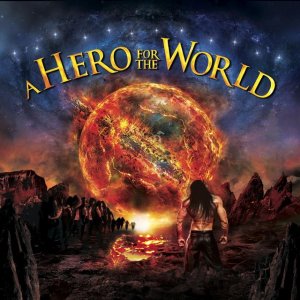 A Hero For the World – s/t:
A Hero For the World – s/t:
Winners for the most ridiculous cover art and band name of 2013 thus far, A Hero For the World (that’s a mouthful dammit) deliver a debut album of rather typical modern power metal that is a mix of Firewind style musicality with Dragonforce goofball lyrics. I have a love for the best of this type of stuff, and a very high degree of tolerance for the mediocre versions. This band falls right above that mediocre category — they have promise but are mired in genre stereotypes to a fault. There are some occasional good moments on offer that suggest that on future releases they’ll manage to find their own sound and make a fan of me. Power metal is supported and nourished in Europe, its modern and ancestral home — so one reason to pay attention to the course of A Hero For the World’s career is that they actually hail from the Philippines. I applaud any new power metal band that steps onto the metal stage from a non-European territory, because lets face it, the very idea is not exactly welcome in local metal scenes anywhere in the United States.
I can hear some slight nods to the geographical cultural impact of the Philippines on a ballad like “Free Forever”, which is carried along by a slightly Asian sounding melody that is actually quite appealing, overriding the triteness of the lyrics. Sadly, there are no other infusions of the music of their region, something I’d think would add some uniqueness to their approach. Oh well, there’s nothing wrong with power metal for power metal’s sake, and whomever is the songwriting force in the band certainly has the budding talent to only get better. I think whats telling for me right now is that I really can’t think of anything else to say about this record… there’s nothing glaringly awful about it, but I highly doubt I’ll be coming back for more listens… there’s just better stuff out there in this vein. Keep trying dudes, I’ll check the next one out for sure.
 Its probably getting a bit predictable by now, that is, the overwhelmingly positive reaction to Queensryche’s new self titled/post-Geoff Tate release. That there are so many interested parties taking a look at this album is perhaps indicative of how high in profile the band’s name has risen thanks to the online spillover of a courtroom/behind the scenes drama that has played out this past year for all to see. In terms of the PR war, there was a clear winner between the competing Queensryche’s long before a shred of new music was even heard from either party: Tate decided that his career would be best served by resembling a slow-crashing, flaming husk of a zeppelin. His version of the band is an internet laughing stock (run a search on blabbermouth for hilarious proof), and his consistently sub-par live performances in the name of Operation:Mindcrime’s 25th anniversary are filmed by concertgoers and uploaded to YouTube as documented proof of his deteriorating vocal ability, his sub-amateur band, and his boneheaded, thuggish antics. So all that the real version of Queensryche had to do was sit back, avoid Tate’s media baiting, and keep it level headed and classy in response. Oh and release an album that’s a little better than the atrocity that was Tate’s Frequency Unknown…yeah, seemed a fairly easy task.
Its probably getting a bit predictable by now, that is, the overwhelmingly positive reaction to Queensryche’s new self titled/post-Geoff Tate release. That there are so many interested parties taking a look at this album is perhaps indicative of how high in profile the band’s name has risen thanks to the online spillover of a courtroom/behind the scenes drama that has played out this past year for all to see. In terms of the PR war, there was a clear winner between the competing Queensryche’s long before a shred of new music was even heard from either party: Tate decided that his career would be best served by resembling a slow-crashing, flaming husk of a zeppelin. His version of the band is an internet laughing stock (run a search on blabbermouth for hilarious proof), and his consistently sub-par live performances in the name of Operation:Mindcrime’s 25th anniversary are filmed by concertgoers and uploaded to YouTube as documented proof of his deteriorating vocal ability, his sub-amateur band, and his boneheaded, thuggish antics. So all that the real version of Queensryche had to do was sit back, avoid Tate’s media baiting, and keep it level headed and classy in response. Oh and release an album that’s a little better than the atrocity that was Tate’s Frequency Unknown…yeah, seemed a fairly easy task.
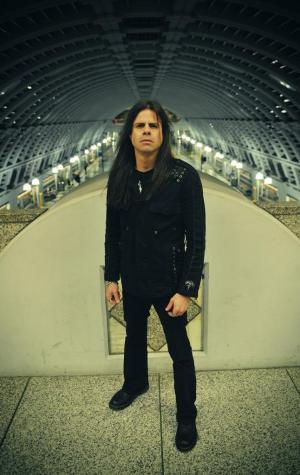 You might notice I haven’t mentioned anything about the performance of new vocalist, ex-Crimson Glory singer Todd LaTorre. And that’s because any question of his abilities should have been put to rest long before this album’s release… I refer of course to the numerous recordings available of his concert performances doing high justice to the band’s back catalog. When you hear recordings of him singing “I Don’t Believe In Love” the way its hasn’t been sung in years, your worries about his performance on a new album go out the window. Before I even had the opportunity to listen to this album, I witnessed the band playing live here in Houston on June 8th on a humid Saturday night. The band was on excellent form, but Todd LaTorre was simply on fire, the damp air and warm weather making an outdoor stage the perfect setting for me to witness the single greatest live vocal performance I have ever heard. It was possible that the versions of classics from the Warning and Rage For Order albums that I heard that night were actually better than the original recordings. For periodic moments during the show, I was in utter disbelief at how fantastic he actually was — it was like watching Lebron in Game 7. At one point a guy next to me shook me by the shoulder excitedly and shouted “Can you believe this guy?!” I responded back, alarmed, “Crazy eh!”
You might notice I haven’t mentioned anything about the performance of new vocalist, ex-Crimson Glory singer Todd LaTorre. And that’s because any question of his abilities should have been put to rest long before this album’s release… I refer of course to the numerous recordings available of his concert performances doing high justice to the band’s back catalog. When you hear recordings of him singing “I Don’t Believe In Love” the way its hasn’t been sung in years, your worries about his performance on a new album go out the window. Before I even had the opportunity to listen to this album, I witnessed the band playing live here in Houston on June 8th on a humid Saturday night. The band was on excellent form, but Todd LaTorre was simply on fire, the damp air and warm weather making an outdoor stage the perfect setting for me to witness the single greatest live vocal performance I have ever heard. It was possible that the versions of classics from the Warning and Rage For Order albums that I heard that night were actually better than the original recordings. For periodic moments during the show, I was in utter disbelief at how fantastic he actually was — it was like watching Lebron in Game 7. At one point a guy next to me shook me by the shoulder excitedly and shouted “Can you believe this guy?!” I responded back, alarmed, “Crazy eh!”
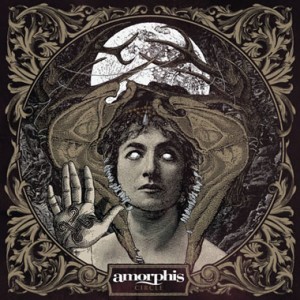 The stuff that’s really been connecting with me lately is in fact wintery dark, morose, bleak, and of course melancholic — and I’ve just decided to be okay with that. Better to write about stuff that’s resonating with me for whatever reason than force feed everyone some half-hearted take on the NEW ANVIL RECORD! So, first off, the new Amorphis album, Circle, is really striking a chord with me in a big way, and the I’ll be honest, I was one of those people who thought Amorphis got better when current vocalist Tomi Joutsen joined the band on 2003’s Eclipse. Okay, I loved Tales From A Thousand Lakes and Elegy, but then began the band’s strange, murky, experimental era, and I simply couldn’t zero in on any of those records. When Joutsen debuted on the “House of Sleep” single, I felt the band got some fire back. Coupled with the fact that there was also stronger emphasis on more rock based songwriting, Joustsen’s ability to deliver incredible melodic and emotional vocals resulted in a far more comfortable fit than Pasi Koskinen’s vocals ever could.
The stuff that’s really been connecting with me lately is in fact wintery dark, morose, bleak, and of course melancholic — and I’ve just decided to be okay with that. Better to write about stuff that’s resonating with me for whatever reason than force feed everyone some half-hearted take on the NEW ANVIL RECORD! So, first off, the new Amorphis album, Circle, is really striking a chord with me in a big way, and the I’ll be honest, I was one of those people who thought Amorphis got better when current vocalist Tomi Joutsen joined the band on 2003’s Eclipse. Okay, I loved Tales From A Thousand Lakes and Elegy, but then began the band’s strange, murky, experimental era, and I simply couldn’t zero in on any of those records. When Joutsen debuted on the “House of Sleep” single, I felt the band got some fire back. Coupled with the fact that there was also stronger emphasis on more rock based songwriting, Joustsen’s ability to deliver incredible melodic and emotional vocals resulted in a far more comfortable fit than Pasi Koskinen’s vocals ever could.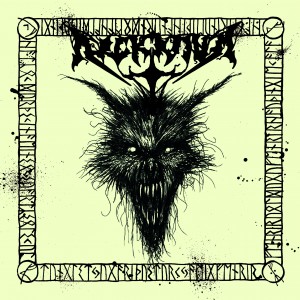 Amorphis took me by surprise, not in that I don’t expect good work from them, but in that I’ve been listening to the album nonstop in a way that I haven’t since I heard Elegy. But if that was a surprise then I’d have to say my enthusiasm for the latest Arckanum offering, Fenris Kindir, is coming as a total shock. This is without a doubt, the best black metal out in 2013 (I know, I know… Darkthrone, but is The Underground Resistance really black metal?), as well as the most immersive listening experience of the year. For those who don’t know, Arckanum has been essentially a one man solo project of Johan Lahger, and he’s made a lengthy go it in releasing albums since the mid nineties. I’ll confess, I’ve been unmoved by this project for the most part, despite being exposed to the past few years of releases… and as is the usual way these things go, I have no explanation for why those previous albums didn’t affect me yet the new one does — but there you go. There’s nothing accessible or commercial about this recording, its pure blistering black metal done in a nod to an old school style, with very little in the way of vibrant melodies.
Amorphis took me by surprise, not in that I don’t expect good work from them, but in that I’ve been listening to the album nonstop in a way that I haven’t since I heard Elegy. But if that was a surprise then I’d have to say my enthusiasm for the latest Arckanum offering, Fenris Kindir, is coming as a total shock. This is without a doubt, the best black metal out in 2013 (I know, I know… Darkthrone, but is The Underground Resistance really black metal?), as well as the most immersive listening experience of the year. For those who don’t know, Arckanum has been essentially a one man solo project of Johan Lahger, and he’s made a lengthy go it in releasing albums since the mid nineties. I’ll confess, I’ve been unmoved by this project for the most part, despite being exposed to the past few years of releases… and as is the usual way these things go, I have no explanation for why those previous albums didn’t affect me yet the new one does — but there you go. There’s nothing accessible or commercial about this recording, its pure blistering black metal done in a nod to an old school style, with very little in the way of vibrant melodies. Finally, something that was bound to happen… the first discussion of a non-metal-related album of music on The Metal Pigeon. Stick with me on this, because if you haven’t treated yourself to the sheer beauty and wonder that is composer Austin Wintory’s epic soundtrack for the PS3 downloadable gaming oddity called Journey, then you’re missing out on something really great. I actually don’t own a PS3, but thanks to YouTube I’ve been able to see the game played, and what I saw was a rather inspired and inventive take on merging gaming into pure visual/interactive art. It was IGN’s Game of the Year for 2012, a huge accomplishment for a small, independent developer overtaking such major heavyweights as Halo 4 for example. Well, I won’t launch into gaming talk here, but suffice it to say the very idea of Journey has a built in metal spirit — to me anyway. You wander alone at first, in this beautiful, desolate, epic landscape, always trying to get to this incredibly huge mountain that looms in the distance, and as you go through your “journey”, other players meet you in your world (or their world) and you can potentially aid one another onwards in your quest. Its an elegant visual metaphor for life, solitude, togetherness, and entropy.
Finally, something that was bound to happen… the first discussion of a non-metal-related album of music on The Metal Pigeon. Stick with me on this, because if you haven’t treated yourself to the sheer beauty and wonder that is composer Austin Wintory’s epic soundtrack for the PS3 downloadable gaming oddity called Journey, then you’re missing out on something really great. I actually don’t own a PS3, but thanks to YouTube I’ve been able to see the game played, and what I saw was a rather inspired and inventive take on merging gaming into pure visual/interactive art. It was IGN’s Game of the Year for 2012, a huge accomplishment for a small, independent developer overtaking such major heavyweights as Halo 4 for example. Well, I won’t launch into gaming talk here, but suffice it to say the very idea of Journey has a built in metal spirit — to me anyway. You wander alone at first, in this beautiful, desolate, epic landscape, always trying to get to this incredibly huge mountain that looms in the distance, and as you go through your “journey”, other players meet you in your world (or their world) and you can potentially aid one another onwards in your quest. Its an elegant visual metaphor for life, solitude, togetherness, and entropy.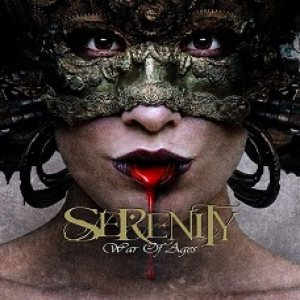 I’m increasingly more aware of how rare it is to stumble upon a band that can utterly transfix my wandering attention span the way Serenity did about a month ago with the release of their spectacular fourth album, War of Ages. The band hails from Austria, a country far more regarded in metal circles as a purveyor of death and black metal bands, most notably Belphegor. Serenity then must be the black sheep of their countrymen, as they specialize in a style of progressive power metal informed by the obvious influences of Kamelot, Sonata Arctica, and maybe even a touch of Avantasia’s latter day hard rock epic strut. This is not to say they are merely the sum of their parts, as Serenity have an identity all their own within the fundamentals of songwriting styles and lyrical concepts — but their influences are a good touchstone and filter for prospective listeners.
I’m increasingly more aware of how rare it is to stumble upon a band that can utterly transfix my wandering attention span the way Serenity did about a month ago with the release of their spectacular fourth album, War of Ages. The band hails from Austria, a country far more regarded in metal circles as a purveyor of death and black metal bands, most notably Belphegor. Serenity then must be the black sheep of their countrymen, as they specialize in a style of progressive power metal informed by the obvious influences of Kamelot, Sonata Arctica, and maybe even a touch of Avantasia’s latter day hard rock epic strut. This is not to say they are merely the sum of their parts, as Serenity have an identity all their own within the fundamentals of songwriting styles and lyrical concepts — but their influences are a good touchstone and filter for prospective listeners. Yes of course I emphasized songwriting, because while the musicianship Serenity display is of the excellent proficiency you’d expect from a European power metal band, the Buchberger/Neuhauser songwriting partnership is the critical heart of Serenity’s success. For anyone who felt/feels that something could potentially be permanently lost from the brilliance that was the Khan/Youngblood songwriting legacy — I’m telling you that the Buchberger/Neuhauser combo strikes right to the heart of the style of music that you and I both love, crave, and sadly can’t seem to find enough of. I’m talking about crisp, melodic, melancholy, triumphant, elegant, and yes actually HEAVY power metal that is written with a head for ambition, an ear for tunefulness, and a writer’s heart for great lyrics. And even though War of Ages is the album that sucked me in as a new fan of the band, I’ve become addicted to the other three albums in their discography as well. And one of the more brilliant examples of all of these aforementioned attributes combining to supreme effect can be found on the bonus track (!) of their 2011 Death & Legacy album, “To India’s Shores”.
Yes of course I emphasized songwriting, because while the musicianship Serenity display is of the excellent proficiency you’d expect from a European power metal band, the Buchberger/Neuhauser songwriting partnership is the critical heart of Serenity’s success. For anyone who felt/feels that something could potentially be permanently lost from the brilliance that was the Khan/Youngblood songwriting legacy — I’m telling you that the Buchberger/Neuhauser combo strikes right to the heart of the style of music that you and I both love, crave, and sadly can’t seem to find enough of. I’m talking about crisp, melodic, melancholy, triumphant, elegant, and yes actually HEAVY power metal that is written with a head for ambition, an ear for tunefulness, and a writer’s heart for great lyrics. And even though War of Ages is the album that sucked me in as a new fan of the band, I’ve become addicted to the other three albums in their discography as well. And one of the more brilliant examples of all of these aforementioned attributes combining to supreme effect can be found on the bonus track (!) of their 2011 Death & Legacy album, “To India’s Shores”. For the War of Ages album, the band made what I can only refer to as a savvy game changer of a decision. Enter into the Serenity lineup one Clémentine Delauney from Lyon, France, as the co-lead vocalist to pair alongside Neuhauser’s powerful voice. This isn’t a gimmick, as they have experimented with a handful of female guest vocalists for select tracks on previous albums — and while the songs and performances have been good (particularly a duet with the always excellent Amanda Somerville on Death and Legacy’s “Changing Fate”), the types of female voices they’ve attempted to pair with Neuhauser never seemed to measure up or alternatively, contrast well with his rich, distinctive tone. I know these women have their fans, but I’ve never been overly impressed with Charlotte Wessels, nor Ailyn from Sirenia, and while Somerville’s duet was excellent, her voice is as strong and full of character as Neuhauser’s and to me it seemed that when they would join together both voices would be fighting for space with no one winning out.
For the War of Ages album, the band made what I can only refer to as a savvy game changer of a decision. Enter into the Serenity lineup one Clémentine Delauney from Lyon, France, as the co-lead vocalist to pair alongside Neuhauser’s powerful voice. This isn’t a gimmick, as they have experimented with a handful of female guest vocalists for select tracks on previous albums — and while the songs and performances have been good (particularly a duet with the always excellent Amanda Somerville on Death and Legacy’s “Changing Fate”), the types of female voices they’ve attempted to pair with Neuhauser never seemed to measure up or alternatively, contrast well with his rich, distinctive tone. I know these women have their fans, but I’ve never been overly impressed with Charlotte Wessels, nor Ailyn from Sirenia, and while Somerville’s duet was excellent, her voice is as strong and full of character as Neuhauser’s and to me it seemed that when they would join together both voices would be fighting for space with no one winning out. I’ve been checking out the tour dates for the band and they’re disappointingly slim, even for Europe… (I have no delusions about the band getting to launch a full tour in the States — I’ll post a very grateful retraction if that ever happens). I’m not sure what the problem is, but I could venture to guess that these guys have day jobs, and that they try to fit Serenity in whenever they can. That’s understandable and to be expected given the state of things in the industry, but I hope they can do more then just a ten date headliner tour of clubs in Europe. But if that doesn’t, or can’t happen then I’d just have one word of advice for the band if they ever happened to read this: Write more songs, record more albums, document your art with a sense of urgency and ambition. You know its an uphill battle if you’re hoping to headline arenas or chart singles, there are very few Nightwish success stories in your chosen genre. So instead, strike while the creative irons are hot and get this stuff on tape. Build your artistic legacy.
I’ve been checking out the tour dates for the band and they’re disappointingly slim, even for Europe… (I have no delusions about the band getting to launch a full tour in the States — I’ll post a very grateful retraction if that ever happens). I’m not sure what the problem is, but I could venture to guess that these guys have day jobs, and that they try to fit Serenity in whenever they can. That’s understandable and to be expected given the state of things in the industry, but I hope they can do more then just a ten date headliner tour of clubs in Europe. But if that doesn’t, or can’t happen then I’d just have one word of advice for the band if they ever happened to read this: Write more songs, record more albums, document your art with a sense of urgency and ambition. You know its an uphill battle if you’re hoping to headline arenas or chart singles, there are very few Nightwish success stories in your chosen genre. So instead, strike while the creative irons are hot and get this stuff on tape. Build your artistic legacy.
 Eclectika – Lure of Ephemeral Beauty:
Eclectika – Lure of Ephemeral Beauty: Boneworm – s/t:
Boneworm – s/t: Boil – aXiom:
Boil – aXiom: A Hero For the World – s/t:
A Hero For the World – s/t: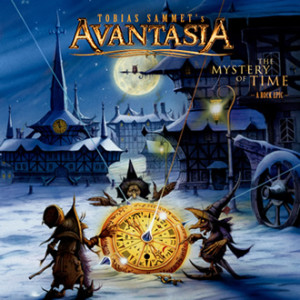 Since I’m going to be talking about Tobias Sammet and Avantasia, I’ll point out that this isn’t a conventional review in the sense that I’m trying to help you decide whether or not to check this album out — because of course you should. Sammet possesses a nearly peerless songwriting ability within the power metal/hard rock spectrum, and with said ability has delivered a career’s worth of superb work through Edguy and of course his solo/all-star project Avantasia. Every Sammet penned album can be guaranteed to contain a small to large handful of gems, and for that fact alone I believe he is worthy of respect and yes even gratitude. Speaking as a power metal fan, that level of consistency is a rare beast in a genre too often full of talented musicians who can’t write a decent tune. I became a fan of the man back in 2000 with Edguy’s seminal classic Mandrake, and both retrospectively and with each new release, Sammet continued to fill the soundtrack of my life with thundering, grandiose power metal epics and emotive, stirring ballads. Few others in power metal deliver the goods as well as he does. So as expected, there’s a lot on my mind regarding this record, and to better help myself keep all my thoughts in order I’ll be breaking this down into categorized, bite-sized chunks:
Since I’m going to be talking about Tobias Sammet and Avantasia, I’ll point out that this isn’t a conventional review in the sense that I’m trying to help you decide whether or not to check this album out — because of course you should. Sammet possesses a nearly peerless songwriting ability within the power metal/hard rock spectrum, and with said ability has delivered a career’s worth of superb work through Edguy and of course his solo/all-star project Avantasia. Every Sammet penned album can be guaranteed to contain a small to large handful of gems, and for that fact alone I believe he is worthy of respect and yes even gratitude. Speaking as a power metal fan, that level of consistency is a rare beast in a genre too often full of talented musicians who can’t write a decent tune. I became a fan of the man back in 2000 with Edguy’s seminal classic Mandrake, and both retrospectively and with each new release, Sammet continued to fill the soundtrack of my life with thundering, grandiose power metal epics and emotive, stirring ballads. Few others in power metal deliver the goods as well as he does. So as expected, there’s a lot on my mind regarding this record, and to better help myself keep all my thoughts in order I’ll be breaking this down into categorized, bite-sized chunks: Some really great songs
Some really great songs Eric Martin / No lame interludes!:
Eric Martin / No lame interludes!:  I’ve always admired great lyricists in metal and elsewhere, and I feel that I’ve been rather patient and forgiving for the typicality of mediocre lyrics that permeate so much of metal. Power metal is unfortunately guilty of harboring some horrendous lyrical massacres, and my love of the overwhelming enjoyability of the genre has forced me to simply accept it as the norm. Sammet isn’t the worst lyricist in power metal — far, far from it — he often writes about interesting subject matter and has a particular English as a second language way with a phrase that is endearing. But I wouldn’t go out of my way to call him a good lyricist either; he overuses words, phrases, and imagery often, he relies on abstraction to a fault, and his tendency to use malapropisms is simply maddening. I let a lot of that go… especially when it comes to lyricists who aren’t writing in their native tongue, but sometimes I wish they’d make use of a proofreader every once in awhile.
I’ve always admired great lyricists in metal and elsewhere, and I feel that I’ve been rather patient and forgiving for the typicality of mediocre lyrics that permeate so much of metal. Power metal is unfortunately guilty of harboring some horrendous lyrical massacres, and my love of the overwhelming enjoyability of the genre has forced me to simply accept it as the norm. Sammet isn’t the worst lyricist in power metal — far, far from it — he often writes about interesting subject matter and has a particular English as a second language way with a phrase that is endearing. But I wouldn’t go out of my way to call him a good lyricist either; he overuses words, phrases, and imagery often, he relies on abstraction to a fault, and his tendency to use malapropisms is simply maddening. I let a lot of that go… especially when it comes to lyricists who aren’t writing in their native tongue, but sometimes I wish they’d make use of a proofreader every once in awhile. I include Kiske because his vocals only work if he’s getting exceptional songs, as he has on past efforts. And while I loved “Sleepwalking”, surely Amanda Somerville would have been a far better choice than Yang — who while not bad, suffers from awkward phrasing, spotty enunciation, and an all around weird approach to vocals… is she trying to be R&B, pop, rock, or none of the above? Hell if I know! As for Byford — I’ve never been a big fan and I can’t help but think when listening to his feature track here, “Black Orchid”, how much better it’d sound if Jorn was on vocals instead.
I include Kiske because his vocals only work if he’s getting exceptional songs, as he has on past efforts. And while I loved “Sleepwalking”, surely Amanda Somerville would have been a far better choice than Yang — who while not bad, suffers from awkward phrasing, spotty enunciation, and an all around weird approach to vocals… is she trying to be R&B, pop, rock, or none of the above? Hell if I know! As for Byford — I’ve never been a big fan and I can’t help but think when listening to his feature track here, “Black Orchid”, how much better it’d sound if Jorn was on vocals instead. Its obvious to myself and other Sammet devotees that Avantasia has gotten most of his attention for the past half a decade now; consider that all of a sudden Avantasia’s total album count tallies at six, only three behind Edguy’s nine. In fact, since 2006, Sammet has delivered four full length Avantasia albums plus two EPs, while Edguy has only released three albums. If Avantasia has gotten the better half of Sammet’s songwriting for the past few years, its reasonable to say that Edguy has diminished in turn. Slowly, gradually, Avantasia has become Sammet’s main priority and Edguy is increasingly an afterthought.
Its obvious to myself and other Sammet devotees that Avantasia has gotten most of his attention for the past half a decade now; consider that all of a sudden Avantasia’s total album count tallies at six, only three behind Edguy’s nine. In fact, since 2006, Sammet has delivered four full length Avantasia albums plus two EPs, while Edguy has only released three albums. If Avantasia has gotten the better half of Sammet’s songwriting for the past few years, its reasonable to say that Edguy has diminished in turn. Slowly, gradually, Avantasia has become Sammet’s main priority and Edguy is increasingly an afterthought. In the case of Greece’s Rotting Christ, this was a band I hadn’t listened to in perhaps under a decade and had long ago written off as uninteresting (I’ve since checked out their back catalog on Spotify only to realize how wrong I was). Unbeknownst to me until now, they’ve been steadily pursuing a musical change of direction on their past couple albums, and its all led to the most radicalized experimentation of their career on Kata Ton Daimona Eaytoy (Do What Thou Wilt), their eleventh studio album to date. Quite simply put, I love this album. Its one of the more bizarre imaginings of black metal that I’ve ever heard really. These guys dig down deep into their Greek heritage for some dark musical inspirations that really separate them from the hordes of Norwegian copycats. Unexpected amounts of melodicism, unorthodox percussive rhythms, very inspired blackened vocal arrangements and original songwriting are just a few touchstones to remark upon. The obvious standout for its sheer accessibility is “Grandis Spiritus Diavolos”, a steadfast march in which the title phrase is repeated in staccato rhythm over a bed of ultra-melodic guitar riffs, some Uli Jon Roth-style solo accompaniment, and Therion-ish choir vocals. On “Cine Jubeste Si Lasa”, things get really bizarre with the addition of very ethnic, gypsy-like female vocals of Souzana Vougioukli that intertwine with Sakis Tolis’ ever blackened grim vocals to hypnotic effect. It took me awhile to process what was going on in the track, but its quickly become a favorite.
In the case of Greece’s Rotting Christ, this was a band I hadn’t listened to in perhaps under a decade and had long ago written off as uninteresting (I’ve since checked out their back catalog on Spotify only to realize how wrong I was). Unbeknownst to me until now, they’ve been steadily pursuing a musical change of direction on their past couple albums, and its all led to the most radicalized experimentation of their career on Kata Ton Daimona Eaytoy (Do What Thou Wilt), their eleventh studio album to date. Quite simply put, I love this album. Its one of the more bizarre imaginings of black metal that I’ve ever heard really. These guys dig down deep into their Greek heritage for some dark musical inspirations that really separate them from the hordes of Norwegian copycats. Unexpected amounts of melodicism, unorthodox percussive rhythms, very inspired blackened vocal arrangements and original songwriting are just a few touchstones to remark upon. The obvious standout for its sheer accessibility is “Grandis Spiritus Diavolos”, a steadfast march in which the title phrase is repeated in staccato rhythm over a bed of ultra-melodic guitar riffs, some Uli Jon Roth-style solo accompaniment, and Therion-ish choir vocals. On “Cine Jubeste Si Lasa”, things get really bizarre with the addition of very ethnic, gypsy-like female vocals of Souzana Vougioukli that intertwine with Sakis Tolis’ ever blackened grim vocals to hypnotic effect. It took me awhile to process what was going on in the track, but its quickly become a favorite. And then there’s new kids on the block Cnoc An Tursa, who defy cheeky boy-band references with what sounds to me like a perfect melding of folk-infused thrash ala early Ensiferum with some of the most excellent blackened vocals that I’ve heard in recent memory. I’ve seen these guys tagged as viking metal or folk metal, and that’s a gross oversimplification. First of all, forget the Viking stuff, these guys are a Scottish band that emphasize a musical and lyrical focus on their nation’s history and culture in a rather eloquent fashion. They draw upon the well of great Scottish poetry for their lyrical inspiration, as in “Bannockburn”, which depicts the battle that was central to the Robert Burns poem of the same name (and they do so in rather Burns-ian language themselves). On other tracks they essentially set a beloved Scottish poem to a bleak, wintry, blackened folk sound scape as with “Culloden Moor”, which works far better than the idea looks on paper.
And then there’s new kids on the block Cnoc An Tursa, who defy cheeky boy-band references with what sounds to me like a perfect melding of folk-infused thrash ala early Ensiferum with some of the most excellent blackened vocals that I’ve heard in recent memory. I’ve seen these guys tagged as viking metal or folk metal, and that’s a gross oversimplification. First of all, forget the Viking stuff, these guys are a Scottish band that emphasize a musical and lyrical focus on their nation’s history and culture in a rather eloquent fashion. They draw upon the well of great Scottish poetry for their lyrical inspiration, as in “Bannockburn”, which depicts the battle that was central to the Robert Burns poem of the same name (and they do so in rather Burns-ian language themselves). On other tracks they essentially set a beloved Scottish poem to a bleak, wintry, blackened folk sound scape as with “Culloden Moor”, which works far better than the idea looks on paper.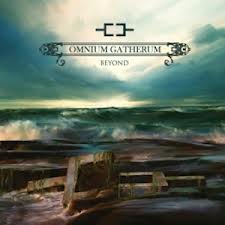 Finally, there’s been the newest release by Finland’s Omnium Gatherum, a band that I was initially introduced to through their highly acclaimed 2011 New World Shadows album. It took me quite awhile to really sink into that album, not because I found it lacking — the opposite actually, there was so much going on that was just way different from anything else I’d come to expect from melodic death metal. Odd drum patterns, alternately shifting tempos, bleak-washing atmospherics, and of course the obsidian vocals of Jukka Pelkonen. This is a weird comparison, but once I finally broke through with repeated listens, it felt like I had cracked the secrets of a musical Rubik’s cube — suddenly it all made sense and sounded right. So getting a chance to hear new music from these guys with that hurdle behind me has been a real pleasure. Their new album, Beyond, is to me an even better collection of music than it’s predecessor. Whether its on the lead single, “The Unknowing”, with its sweeping arpeggio based musical refrain that is as cinematic as it is memorable, or on the breathy, acoustic laced “Luoto” and its buildup to the hooky rock guitar driven “New Dynamic”; this album delivers with a diverse range of songs that stretch the band’s trademark sound. This is especially true on the clean vocal laden “Who Could Say”, in which Pelkonen seems to draw on equal parts Sentenced and Amorphis.
Finally, there’s been the newest release by Finland’s Omnium Gatherum, a band that I was initially introduced to through their highly acclaimed 2011 New World Shadows album. It took me quite awhile to really sink into that album, not because I found it lacking — the opposite actually, there was so much going on that was just way different from anything else I’d come to expect from melodic death metal. Odd drum patterns, alternately shifting tempos, bleak-washing atmospherics, and of course the obsidian vocals of Jukka Pelkonen. This is a weird comparison, but once I finally broke through with repeated listens, it felt like I had cracked the secrets of a musical Rubik’s cube — suddenly it all made sense and sounded right. So getting a chance to hear new music from these guys with that hurdle behind me has been a real pleasure. Their new album, Beyond, is to me an even better collection of music than it’s predecessor. Whether its on the lead single, “The Unknowing”, with its sweeping arpeggio based musical refrain that is as cinematic as it is memorable, or on the breathy, acoustic laced “Luoto” and its buildup to the hooky rock guitar driven “New Dynamic”; this album delivers with a diverse range of songs that stretch the band’s trademark sound. This is especially true on the clean vocal laden “Who Could Say”, in which Pelkonen seems to draw on equal parts Sentenced and Amorphis. There will be many — so so many reviews, opinions, forum rants, and of course YouTube comments that will take some pretty sharp, barbed digs with the metal pitchfork to this band and their new album The Nexus. Amaranthe offend many with a combination of sounds that hands tallied most metal fans would agree should not have ever been attempted. I’ve seen the old “just because something can be done, does not mean it should be done” line more than a few times in the past couple days. Conversely, this is a band with a surprisingly large contingent of often quite vocal supporters, many of them writing reviews for well known print and digital publications, and of course, they’ll be out there in full force online, equalizing the rebukes and jeers with various expressions of high praise — some of which will be ludicrously exaggerated. So here’s where I’ll step in, to offer a perspective from a fairly neutral middle ground.
There will be many — so so many reviews, opinions, forum rants, and of course YouTube comments that will take some pretty sharp, barbed digs with the metal pitchfork to this band and their new album The Nexus. Amaranthe offend many with a combination of sounds that hands tallied most metal fans would agree should not have ever been attempted. I’ve seen the old “just because something can be done, does not mean it should be done” line more than a few times in the past couple days. Conversely, this is a band with a surprisingly large contingent of often quite vocal supporters, many of them writing reviews for well known print and digital publications, and of course, they’ll be out there in full force online, equalizing the rebukes and jeers with various expressions of high praise — some of which will be ludicrously exaggerated. So here’s where I’ll step in, to offer a perspective from a fairly neutral middle ground.
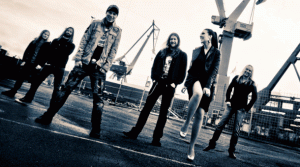 When you see the term “supergroup” applied to Amaranthe, its a total misnomer. While Mörck is fairly central to the Dragonland project, their music never attracted much notice beyond hardcore power metal devotees, and those of us who were enthralled with their take on Limahl’s “The Neverending Story” (yes THAT song) from 2002’s Holy War album. Mörck’s time in Nightrage has been limited to their post-2006 era, being the replacement for founding member Gus G. and arriving well after the acclaimed Tomas Lindberg era. Jake E. meanwhile is often noted as being a former member of Dream Evil, yet his time in the band yielded no recorded output, being only a brief stint as the band’s vocalist for six months. His tenure with the now-on-hiatus melodic power metal band Dreamland attracted little notice apart from being associated with Hammerfall’s Joacim Cans early in their development. I’ll avoid getting into the blips of time that the remaining Amaranthe members have been in their oft-cited past bands.
When you see the term “supergroup” applied to Amaranthe, its a total misnomer. While Mörck is fairly central to the Dragonland project, their music never attracted much notice beyond hardcore power metal devotees, and those of us who were enthralled with their take on Limahl’s “The Neverending Story” (yes THAT song) from 2002’s Holy War album. Mörck’s time in Nightrage has been limited to their post-2006 era, being the replacement for founding member Gus G. and arriving well after the acclaimed Tomas Lindberg era. Jake E. meanwhile is often noted as being a former member of Dream Evil, yet his time in the band yielded no recorded output, being only a brief stint as the band’s vocalist for six months. His tenure with the now-on-hiatus melodic power metal band Dreamland attracted little notice apart from being associated with Hammerfall’s Joacim Cans early in their development. I’ll avoid getting into the blips of time that the remaining Amaranthe members have been in their oft-cited past bands. On The Nexus, they seem to be following the don’t fix it if it isn’t broken blueprint, which is shrewd and smart, yet subject to a touch of the sophomore slump. And before I delve into that let me just state that this album isn’t a mind changer by any means. Whatever you felt after listening to that first album is likely what you’re going to feel if you decide to listen to this one. As I mentioned before, I completely understand why so many find this stuff distasteful, and if you’re one of those people, you’d do yourself no favors subjecting your ears to this album. For those of us who did find some enjoyment in their debut, new songs like “Invincible”, “Future on Hold”, “Stardust”, and “Infinity” with its dual lead vocal harmonies offer similarly pleasing melodic ear candy. I’m usually pretty big on quality lyrics, and they’re only serviceable at best here. Sometimes its hard to tell what some of these songs are going on about; but it doesn’t factor into the enjoyment level one way or another.
On The Nexus, they seem to be following the don’t fix it if it isn’t broken blueprint, which is shrewd and smart, yet subject to a touch of the sophomore slump. And before I delve into that let me just state that this album isn’t a mind changer by any means. Whatever you felt after listening to that first album is likely what you’re going to feel if you decide to listen to this one. As I mentioned before, I completely understand why so many find this stuff distasteful, and if you’re one of those people, you’d do yourself no favors subjecting your ears to this album. For those of us who did find some enjoyment in their debut, new songs like “Invincible”, “Future on Hold”, “Stardust”, and “Infinity” with its dual lead vocal harmonies offer similarly pleasing melodic ear candy. I’m usually pretty big on quality lyrics, and they’re only serviceable at best here. Sometimes its hard to tell what some of these songs are going on about; but it doesn’t factor into the enjoyment level one way or another.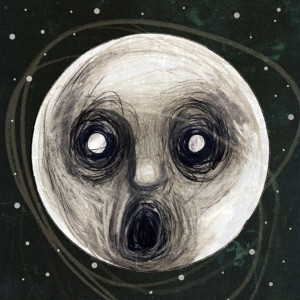 I’ve come to a downer of a realization in that I am experiencing an ever increasing disinterest in the new music being released by one of my favorite artists ever, the prolific and amazing Steven Wilson. He’s worthy of those two adjectives still, the first because its true (Porcupine Tree/ Solo Albums/ Blackfield/ Bass Communion/ No Man/ Storm Corrosion/ various production work), and the second because to me and many others, he’s responsible for some of the most inspired, interesting, and emotive music that I’ve ever heard, regardless of genre, period.
I’ve come to a downer of a realization in that I am experiencing an ever increasing disinterest in the new music being released by one of my favorite artists ever, the prolific and amazing Steven Wilson. He’s worthy of those two adjectives still, the first because its true (Porcupine Tree/ Solo Albums/ Blackfield/ Bass Communion/ No Man/ Storm Corrosion/ various production work), and the second because to me and many others, he’s responsible for some of the most inspired, interesting, and emotive music that I’ve ever heard, regardless of genre, period.
 There’s a moment on the new Darkthrone record, the typically Fenriz-esque titled The Underground Resistance, where you might smile and think to yourself, “These cheeky bastards.” Its at the start of “Valkyrie”, where Metallica-esque acoustic guitars chime in a ghost version of the reoccurring melody that carries this really bad-assed musical ode to classic metal of the 80s. Its a moment that I speculate was left in purely to piss off those people who tend to allow themselves to get pissed off over newer Darkthrone music.
There’s a moment on the new Darkthrone record, the typically Fenriz-esque titled The Underground Resistance, where you might smile and think to yourself, “These cheeky bastards.” Its at the start of “Valkyrie”, where Metallica-esque acoustic guitars chime in a ghost version of the reoccurring melody that carries this really bad-assed musical ode to classic metal of the 80s. Its a moment that I speculate was left in purely to piss off those people who tend to allow themselves to get pissed off over newer Darkthrone music.


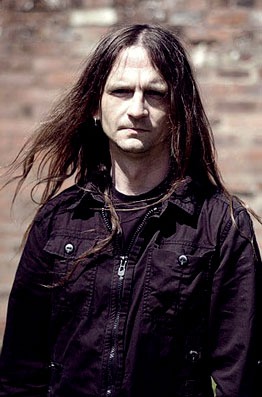 I understand all bands have to end sometime, but you’d rather the end come through a natural course of progression such as key band members leaving, artistic changes of heart, or feeling like they’ve said all they can say. The gut feeling with Power Quest is that Williams was on to something fresh with 2011’s Blood Alliance and its increased blend of 80’s AOR with traditional power metal, and that they’re leaving with their career’s work unfinished. It really does feel as if these guys had a few more albums left on the table, and that they’re having to walk away now is a shame.
I understand all bands have to end sometime, but you’d rather the end come through a natural course of progression such as key band members leaving, artistic changes of heart, or feeling like they’ve said all they can say. The gut feeling with Power Quest is that Williams was on to something fresh with 2011’s Blood Alliance and its increased blend of 80’s AOR with traditional power metal, and that they’re leaving with their career’s work unfinished. It really does feel as if these guys had a few more albums left on the table, and that they’re having to walk away now is a shame.